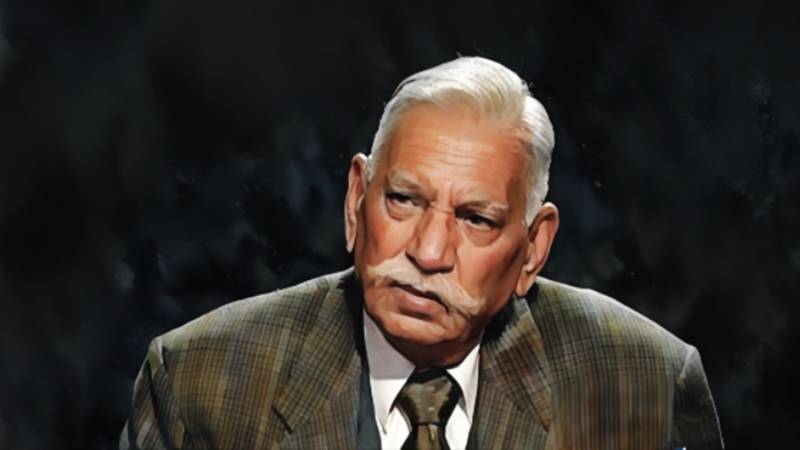
Lt Gen Faiz Ali Chishti (retd) left for his heavenly abode a few days ago on 23 December 2024. He was a key figure in imposing martial law on the 5th of July 1977. His legacy shall continue to rest on the events of that day.
Two years before his death, Faiz, as patron-in-chief of the Pakistan Ex-Servicemen Society (PESS) said, and I quote, “I’ve seen Pakistan flourishing and also separating into two parts, but now I’m seeing it sink.” What he didn't ever admit in his post-1977 life was that he is one of those who, in collaboration with General Zia-ul-Haq, drilled one of the biggest holes in the ship called Pakistan – which he, at the ripe old age of 95, felt was sinking. Had he not criminally conspired to overthrow an elected prime minister and then have him hanged, in what has now been accepted by the Supreme Court as a judicial murder, Pakistan would have been floating in calmer waters. It would have been in a much better state of economic development and religious harmony: two casualties of his actions on that fateful night of 5th July 1977.
The politicians quarrel, discuss, curse, malign and slander each other, but then, compromise and move on. Alliances are formed and broken. Such is the nature of democracy. On 4th of July 1977, there was room for compromise between Bhutto and his political adversaries. Some conscientious and noble soldiers refused to fire on their civilian counterparts on behalf of government. That should have left the politicians alone to sort out the mess they had created. Things would have been politically settled but Zia took advantage of their disagreement.
Faiz Chishti, as the commander 10 Corps, had his plans ready, and induced Zia to take over. "Murshid! Marwa na dena," Zia had reportedly warned, but Faiz had his guns and men ready. The prime minister house was captured. The state TV station was stormed. The nation was conquered. A junta was installed. A long cold night befell across whatever was left of Pakistan. The tragedy of 1971 was barely six years old but the then generals had learned nothing.
Zia caused Faiz to retire in 1980. If the latter had read Machiavelli from Tuscany or Chanakya from Taxila, he would have known this to be in the nature of dictatorship
Since that accursed day of July, forty seven years ago, this nation has known no peace. Faiz caused – perhaps even planned along with Zia – religious, linguistic and ethnic divisions in the country; schisms that have deepened and widened with each passing year. Proliferation of guns, drug use, jihadi culture, religious extremism, social violence, suicide bombers and political intolerance are the bitter fruits of his legacy. Before 1977, there was scant hypocrisy in the nation: since then it is the norm. Due to the violence unleashed by the junta, countless mothers have lost their peaceful sons, and thousands of brave soldiers have given the ultimate sacrifice.
This poor nation raised him to a high status and gave him a gun. He turned that gun against the very people who had paid for it, for their own protection. There cannot be a bigger violation and betrayal of trust.
Zia caused Faiz to retire in 1980. If the latter had read Machiavelli from Tuscany or Chanakya from Taxila, he would have known this to be in the nature of dictatorship, which, unlike democracies, cannot share power. According to Faiz himself, in his book Betrayals of Another Kind, Zia feared him. A reading of this book indicates that the two were manoeuvring against each other in a replay of the Iskander Mirza and Ayub Khan tussle. However, with the backing of the US, in exchange for facilitating war against USSR in Afghanistan, Zia had become secure. He didn't need the ‘Murshid,’ who he knew was capable of devising sinister plans and having them executed efficiently.
After retirement, Faiz conveniently realised the merits of democracy. In his book, he tried to distance himself from Zia. That is the epitome of deceit. His book is political in nature and shows him at the heart of the martial law clique, right through till the murder of Bhutto. He was thus one of those who helped derail Pakistan, perhaps irredeemably.
The hapless people of this country don't know what good the deceased has done in his life but it is acknowledged that he joined the army, did well in his profession and rose to be a three-star general – which in itself that is an applaudable achievement. However, he would always be known for his criminal participation on that dark July night of long knives. As Shakespeare said in Julius Caesar through the funeral oration of Mark Anthony, "The evil that men do lives after them; The good is oft interred with their bones." The evil done by the junta in 1977 lives on and has nearly sunk our ship. Along with Brutus, Faiz Chishti rightly qualifies for Mark Anthony's funeral oration.
On a personal note, from a retired no-star general (for that is what a colonel in the army, a captain in the navy and a group captain in the air force is) to a retired three star general: I could wish you peace, but that would be an act of hypocrisy. The newspaper said that you were looked after well by top doctors in an elite medical unit and died in bed.
Frankly speaking, sir, you deserved the punishment for high treason. Your actions deprived my nation of peace.
Farewell, Faiz Chishti. The harm that you did lives on.

